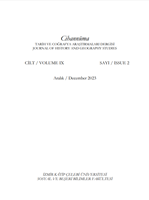İSLAM TOPLUMUNDA VERGİ VE ABBÂSÎLERİN KURULUŞ SÜRECİNE ETKİSİ
TAX IN THE ISLAMIC SOCIETY AND ITS IMPACT ON THE FORMATION OF THE ʿABBĀSIDS
Author(s): Öznur ÖzdemirSubject(s): 6th to 12th Centuries, 13th to 14th Centuries, History of Islam, Sociology of Religion, History of Religion
Published by: İzmir Kâtip Çelebi Üniversitesi, Sosyal ve Beşeri Bilimler Fakültesi
Keywords: Umayyad Period; ʿAbbāsid Revolution; Tax; Jizya; Kharaj;
Summary/Abstract: Since the early years of Islam, taxation has been considered a delicate issue. Zakah is ordered in the Qur'an as a religious duty for Muslims and its positive impact on the economy and society was also emphasized by Prophet Muhammad with his words and practices. During the reign of Caliph Abū Bakr, the Islamic army had a war with people who refused to pay zakah although they accepted to pray (salah). The determined attitude on this matter established a basis for the instutionalization of zakah in the following years. A similar policy on taxation was followed during the reign of Caliph Omar. However, in addition to the zakah, which is gathered from Muslims and the jizya from non-Muslims, Muslims established an economic order with the tribute tax (kharaj) after the conquests of Sawad region. In order to ensure the distribution of what is collected from the public to the public, the diwan system was established, and the economic relationship between the individual and the state was highly considered. The narrations confirm that the Caliph and the companions cared about establishing a just balance based on taxes between the individual and the state. And for this reason, they had even counted the lands captured by war as fay. However, in the following years, some problems arose related to mawālī, conversion and taxes, and this situation led people to dissatisfaction, especially the non-Arab people. The unfair practices which led people to join the ʿAbbāsid revolution and the reforms to correct the injustice by the Umayyads in the last period shows that the tax practice differed considerably from the early periods of Islam. By investigating tax from the last years of Umayyads to the ʿAbbāsids, this study aims to contribute to the theories on the economic reasons for the revolution besides the religious and social ones.
Journal: Cihannüma: Tarih ve Coğrafya Araştırmaları Dergisi
- Issue Year: IX/2023
- Issue No: 2
- Page Range: 69-89
- Page Count: 21
- Language: Turkish

